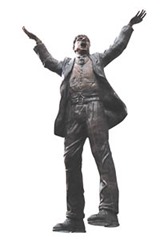A society, if you can keep it
 John O’Farrell warns that austerity will permanently end some public services and highlights how funding the arts links into other policy aims.
John O’Farrell warns that austerity will permanently end some public services and highlights how funding the arts links into other policy aims.
Cut by cut across department by department: the reduction in public services is manifesting itself in a hundred different ways – all of which diminishes our society. Respite care for MS sufferers, orchestral music in schools, street lights and salted roads, safer workplaces, supply teachers – each day brings another cut, another reduction from the menu of choices.
We shrink as a society with each slicing. We matter less to each other. We become leaner and meaner. Austerity coarsens and worsens us.
Society is different from community. It is not limited to a specific group of people. Society is bigger, stronger despite and because it is mutually dependent. Society consists of individuals and families interacting with each other in everything they do.
Society is the balance of rights and responsibilities, where the market and the state support each other and each is diminished when one is reduced. Society is not a zero-sum game. However, these cuts and this ideology behind austerity act as if it is.
In March 2013, Seamus Heaney summed it up: “We are not simply a credit rating or an economy but a history and a culture, a human population rather than a statistical phenomenon”.
That is what is missing from the discussion. The old cliché about “campaigning in poetry and governing in prose” is outdated. We are being ruled with the logic of the numbers, and we are constantly lectured that the numbers never lie and that they have no ideology; cold, hard, facts.
The MP for Fermanagh and South Tyrone has a good word for that thinking, which I will not repeat here. But we have reached the time for very blunt language, because what is being imposed upon us are a series of daily obscenities, and once we acquiesce in their removal we have no guarantee that they will ever come back.
Take (as one example among hundreds) the Ulster Orchestra, and the callow gloating of the Philistines on the talk shows and twittersphere. The sham populism of the tin-eared ignores the value of the contribution the UO makes not only to music but also to education, older people and disadvantaged communities. DCAL says in its consultation on the draft Budget that it is devising a strategy on arts and culture that will look at the potential of the arts and culture sector as a driver for the achievement of broader social and economic goals such as social inclusion and cohesion, urban regeneration, tourism, inward investment, employment, development of high added value creative industries, education and health. The Ulster Orchestra spectacularly meets these criteria.
Now, repeat all that in 140 characters or less.
Facts and context are elbowed aside in the rush to slash someone else’s hobby horse. The plebs are handed scraps to fight over and myths about their competition. Why else are we spending so much time finding solutions to problems that barely exist? It is a myth that the UK benefit system is under pressure from benefit tourism or that the NHS is straining under the pressure of Europe’s huddled and sickened masses.
The Prime Minister’s Black Friday speech on immigration was full of dog-whistle fables, a truly revolting spectacle for those of us who have moved to the UK from other EU states. Cameron dismissed the contribution of millions of hard-working tax-payers and kowtowed to the closet racists of UKIP and their propagandists.
Speaking of obscenity, there is much complaining about local politicians and the tone of their language. I have a bigger problem with politicians declaiming that they will protect ‘their’ people from imaginary enemies and symbolic foes while shrugging their shoulders at real threats to the livelihoods of the voters. MLAs and ministers sound like hostages with Stockholm syndrome, rationalising the assertions of their abuser and passing it on down the chain. What is it that prevents them from saying: “No, up with this we will not put?”





